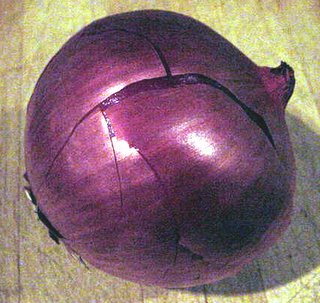 This week's featured foodstuff is the red onion. As simple as it is complex, the red onion works on so many levels. The research crew here found some history on the wwiz.com:
This week's featured foodstuff is the red onion. As simple as it is complex, the red onion works on so many levels. The research crew here found some history on the wwiz.com:
"The ubiquitous onion has a long, distinguished history and, like garlic, has been endowed with healing properties and mystical significance. For the ancient Egyptians, the onion's nine encircling layers represented eternity. Two thousand years ago, Egyptian princes were reputed to have spent 90 tons of gold buying them just to keep the workmen laboring on the pyramids in good health and spirits. That's a lot of gold and a whole lot of onions!
Throughout world history, onions have been thought of as food for the poor, since the strong odor and taste offended the palates of the wealthy. Yet history also reveals that onions were grown in the gardens of kings, such as Ur-Nammu of Ur in 2100 B.C.
The onion's spherical shape and concentric rings made it a powerful symbol for the universe and for the sun god. The round layers of the onion represented heaven, hell, earth and the universe. The form of the onion was a powerful image of divine perfection.
The vegetable itself was sometimes treated as a sacred object. Some Egyptians would swear their oaths on an onion, as a guarantee of good faith. Priests would not eat them, maybe as a sign of religious commitment or as a way of impressing the public with a feat of abstinence. Mourners and worshipers would sometimes bring onions as funeral gifts during the Old Kingdom period (c. 2615 to 2175 B.C.). A basket of onions was second only to bread as a valued offering. Onions appear in chapel altar pictures; in fact, Egyptian craftsmen would sculpt several vegetable forms in precious metals for the priests to use as temple offerings to the gods.
Still, the most intriguing fact about the onion as it existed in Egypt is in its relationship to the afterlife. According to James E. Harris and Kent R. Weeks, authors of X-Raying the Pharaohs: `They (Egyptians) recognized death, of course, but for them it was not the final, absolute end. Rather, it was the continuation of life in a different form. What they enjoyed and found pleasant in this life they tried to take with them in the next. To insure this, techniques of mummification were developed."
In this process, onions and garlic had both a spiritual and a physical role to play. The body of a deceased person had to be preserved for eternity to insure a "lasting home for the soul," and offerings, including food were placed in or near the tomb to be on hand in the afterlife. Sometimes real food was used, but sometimes scenes or sculpture depicted the items, which became ``real" through rites of magic. Some Egyptologists theorize that onions may have been used because their strong scent and/or magical powers would prompt the dead to breathe again. Other Egyptologists believe it was because onions and garlic were known for their strong antiseptic qualities, which were construed as magical and would be handy in the afterlife.
We do not know exactly when the onion reached Greece. According to Waverley Root in Food, by the time of the Athenian statesman Pericles (born c. 95 B.C.), the market of Athens was selling edible plants. Most of these vegetables were expensive and sold in small quantities, but onions were abundant–and affordable. That is probably why they were widely consumed, especially by the poor. It may also be why they were fed to soldiers.
The Israelites partook of Egyptian onions before Moses let them into Canaan. In the book of Numbers, in the story of the hardships of the odyssey, the Israelites speak fondly of the foods they had enjoyed and leeks, onions and garlic were among the six things that were mentioned.
Centuries later, Pliny the Elder, Rome's keen-eyed observer, wrote of Pompeii's onions before he was overcome and killed by the volcano's heat and fumes. Excavators of the doomed city would later find gardens where, just as Pliny had said, onions had grown. The bulbs had left behind telltale cavities in the ground.
From ancient times, onions have marched through history, a staple and universal foodstuff. They remained that way until the dawn of science, awaiting the magic of contemporary botanists, who would make the humble onion blossom into a bewildering array of shapes and forms.
Today onions are still so important that they are incorporated into everyday sayings, i.e. the French sometimes say, "Occupe toi de tes oignons" (Mind your business.)
No comments:
Post a Comment